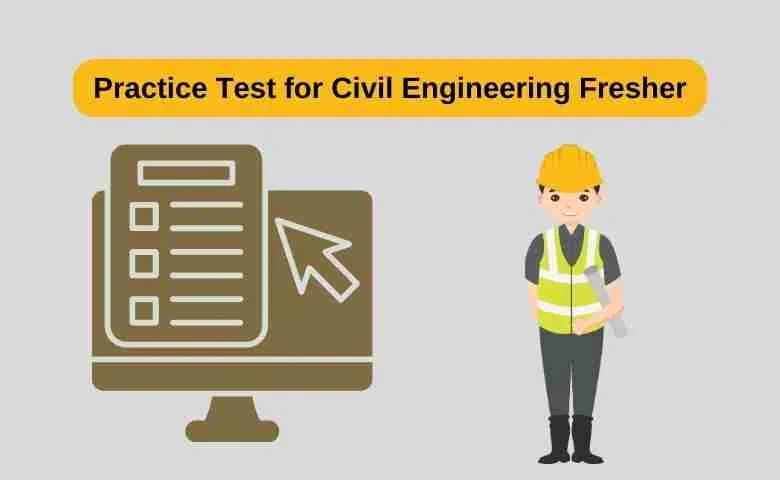Last Updated on June 18, 2025 by Admin
If you’re a recent graduate in civil engineering, you’re likely preparing to enter the workforce and embark on a career in this exciting and dynamic field. However, before you can begin your job search, it’s important to make sure you have a solid understanding of the core concepts and principles of civil engineering.
One way to assess your knowledge and identify areas needing additional study is to take a practice test. As a civil engineering fresher, take this practice test to test your subject knowledge and prepare for your next civil engineering interview.
The transition from academic life to professional practice can be challenging. The knowledge and skills you acquired during your studies form the foundation of your professional competence. Still, it’s essential to continually assess and enhance your understanding to meet the demands of the industry.
This continuous learning process is crucial because civil engineering constantly evolves with technological advancements, materials, and methodologies. Therefore, staying updated with the latest trends and practices is vital for your professional success and growth.
As a civil engineering fresher, you might feel overwhelmed by the breadth of topics you must master. Civil engineering covers many disciplines, including structural engineering, geotechnical engineering, transportation engineering, environmental engineering, and water resources engineering. Each of these areas has its own principles, methodologies, and technical knowledge you need to understand thoroughly.
A practice test can help you break down this vast subject matter into manageable sections. For example, you might start with fundamental topics such as statistics, dynamics, and material science before moving on to more specialized subjects like soil mechanics, fluid dynamics, and structural analysis. You can ensure a comprehensive understanding of civil engineering by systematically testing your knowledge in each area.
In addition to reinforcing your technical knowledge, practice tests can also prepare you for your next civil engineering interview. Employers in the civil engineering sector often seek candidates who possess strong technical skills and demonstrate critical thinking, problem-solving abilities, and practical communication skills.
During an interview, you may be asked to solve engineering problems on the spot or discuss how you would handle specific project scenarios. Practice tests can help you develop the analytical skills and confidence needed to perform well in such situations.
Furthermore, preparing for interviews through practice tests allows you to familiarize yourself with the types of questions that may be asked. These questions can range from theoretical inquiries about engineering principles to practical problems that require applying your knowledge to real-world situations. By practicing with these questions, you can develop a strategic approach to answering them, ensuring that you provide clear, concise, and well-reasoned responses.
Another benefit of taking practice tests is that they can help you manage your time effectively. Time management is a critical skill in both exams and professional settings. Practice tests typically have a time limit, encouraging you to think quickly and make decisions efficiently. This experience can be invaluable during job interviews, where you may need to provide timely responses to technical questions or case studies.
Moreover, practice tests can serve as a benchmark for your progress. By regularly taking these tests, you can track your improvement over time and adjust your study strategies accordingly. For instance, if you consistently perform well in certain areas but struggle with others, you can allocate more time and resources to address your weaknesses. This targeted approach to studying can enhance your overall proficiency and readiness for the professional world.
In conclusion, taking a practice test as a civil engineering fresher is a crucial step in preparing for your career. It allows you to assess your knowledge, identify areas for improvement, and develop the skills needed for successful job interviews. By incorporating practice tests into your study routine, you can build a solid foundation of civil engineering principles, enhance your confidence, and increase your chances of securing a rewarding position in this dynamic field. So, take the initiative to test your subject knowledge and prepare thoroughly for the exciting opportunities that await you in the world of civil engineering.
Related Posts:
- 7 Things You Need to Do Before Starting a Demolition.
- Civil Engineering Fresher Jobs | Various Industry Sectors to Find Jobs
- Key Essentials for Fresh Engineering Graduates: What You Need to Know Before Entering the Job Market
- How to Get a Job as a Recent Graduate [Ultimate Guide]
- What are the Points to Consider While Taking Boiler Repair Services?
- Crafting the Perfect Civil Engineering Resume: Sample Formats, Tips, and Examples



